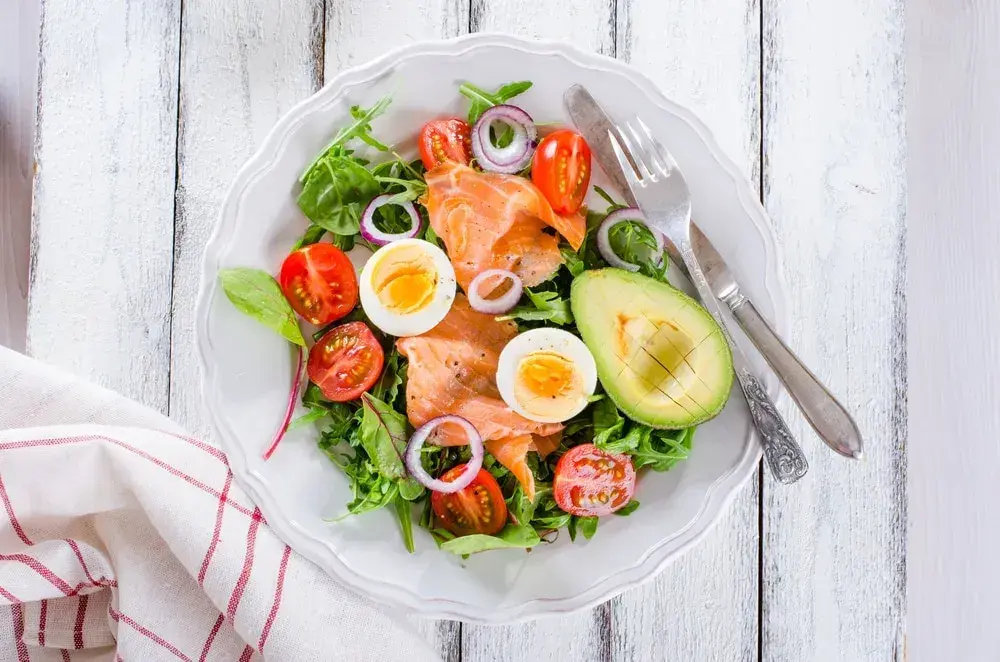
/assets/images/provider/photos/2579788.jpg)
The internet is full of nutrition advice that is contradicting and confusing. It’s no wonder so many of us have no idea where to start when it comes to getting healthier or losing weight. But, if we go back to basics, we can find a way to meet our health goals without losing our collective minds in the process. The following nutrition facts will help you get on the path to wellness.
1. There’s a difference between hunger and cravings
In today’s world, many of us have constant access to food. This often leads to all-day munching and snacking. However, this is not how our bodies naturally evolved. Humans had to seek out food and prepare it. Food was not a convenience: it required work.
Our easy access to food today is one of the reasons many people struggle with weight. We lose our ability to listen to our body’s hunger cues because food is always available. We may eat for emotional reasons, such as boredom or stress. All of this adds up to excess calories and sometimes health problems associated with unhealthy eating behaviors.
There’s a way to fix this: focus on listening to your body and determining when you are actually hungry. When you are hungry, you will be willing to eat almost anything, including a salad or some fruit and nuts. You may feel a rumbling in your stomach. If, on the other hand, only chips or cookies will do, you know you’re not really that hungry.
This is the difference between hunger and cravings, and you can learn to recognize when your body is truly ready for its next meal.
2. You are ruining your diet — and good health — with sugary drinks
It’s no secret that excess sugar is bad for you for many reasons, including increasing your risk of diabetes and weight gain. And many experts agree that sugary drinks such as soda, sports drinks, and even fruit juices are the single worst source of sugar that many people are consuming.
In fact, the 2015-2020 Dietary Guidelines for Americans states that people should eat no more than 12 teaspoons of sugar each day. This is a maximum amount, and ideally, we should be consuming much less. The average American, however, is consuming a whopping 17 teaspoons daily, and half of it comes from sugary drinks.
These types of beverages add lots of calories and flood your body with unhealthy fructose. And while they do this, they do not satisfy hunger or help you eat less. In fact, some evidence suggests that sweet drinks can actually make a person want to eat more.
3. Fat is not the enemy
While the low-fat diet craze of the 1990s still lingers online and in some health circles, most experts today will tell you that eating fat does not make you fat. And, many types of fat are necessary for good health and a number of important processes in your body.
Monounsaturated fats, such as those found in olive oil and avocados, boost heart health and slash your risk of heart attack and stroke. Omega-3 fats found in fish, eggs, and grass-fed beef are necessary for proper brain function, heart health, and inflammation-fighting power that can lower your risk of diseases like diabetes, Alzheimer’s disease, and cancer. Omega-3 fats may also actually help you lose weight.
So when it comes to eating fat, the amount isn’t nearly as important as the type. Steer clear of the “low-fat” label and instead, look for the foods mentioned above that contain beneficial fats and make them part of a balanced diet.
4. Trans fats should be avoided at all costs
With all this said about eating fats, there is one fat in particular that is extremely unhealthy: trans fats. Trans fats are created when liquid vegetable oil is exposed to high heat, pressure, and hydrogen to make it solid at room temperature. Trans fats are sometimes called partially hydrogenated oils.
Food manufacturers started adding trans fats to processed foods more than 100 years ago to help keep them shelf stable. But, after years of people eating them, health experts have realized that they are extremely unhealthy. They can lower good HDL cholesterol and raise bad LDL cholesterol. They dramatically increase a person’s risk for heart disease. The Food and Drug Administration says removing trans fats could prevent thousands of deaths.
Although the FDA recently banned them from foods, trans fats can still be found in some processed foods until 2020. Look at the label and a check for partially hydrogenated oils in the ingredients. Even if the product says it contains 0 grams of trans fats, it may still contain a small amount of hydrogenated oils. No amount of trans fats is healthy. If the product contains any partially hydrogenated oils, look for a better alternative.
5. Skinny and healthy are not the same thing
Your body weight is determined by many different factors, including a few that you simply cannot control. Genetics and DNA, for instance, play a role in your body’s size and how it distributes fat. They also help control your metabolism and how easily you gain or lose weight.
That said, some people are perhaps over the “ideal” body weight when it comes to the scale, but they are extremely healthy. On the flip side, some people are naturally thin, but their lifestyle is unhealthy and they may even have health issues such as diabetes or high blood pressure.
Simply looking at someone’s body type does not tell you their health. So, try not to get frustrated if you don’t look like a celebrity or a person in a magazine. What matters is whether you make your health the priority by eating nutritious foods and getting regular exercise. In addition, get plenty of sleep and work hard to manage stress. These things matter much more than a number on a scale or how you may look in a swimsuit.
6. Calorie counting does not work for everyone
While some diet experts insist that weight loss is as simple as calories in and calories out, many people realize that it’s just not that simple. Obesity is an increasing problem in our country because weight is governed by complicated bodily processes, and it’s about much more than the number of calories you eat.
Other diet approaches that do not count calories, including an intermittent fasting diet, have been shown to be more effective than a reduced calorie diet. They’re also easier to adhere to because they don’t result in feeling hungry all the time.
Counting calories does not take into account your unique needs when it comes to nutrition and weight loss. As we’ve already discussed, your genetics and DNA play a huge role in your weight and your individual needs when it comes to weight loss. Your body may respond better to certain types of food and specific eating plans, and a low-calorie diet doesn’t do this. This is why, for many people, counting calories simply doesn’t work.
7. Vitamins are helpful — but whole foods are crucial
Some people who hate vegetables may believe that they can take vitamins and supplements instead of eating their greens. Unfortunately, this is simply not true.
A quality vitamin and mineral supplement is essential in today’s world, where our diets are often lacking in certain key nutrients. However, this should be, as the name suggests, a supplement — not a replacement for real food.
Vegetables, fruits, and other whole foods contain nutrients that are not found in vitamins. These special nutrients can help fight disease and even help you live longer. In addition, these foods are loaded with fiber, which can help you feel full if you’re trying to eat less or slim down.
8. You don’t need to give up coffee
Many people believe that coffee is a bad habit that they should kick. This belief has no scientific evidence. In fact, studies show that coffee is a major source of antioxidants for many people.
The only problem with coffee is when people load it with sugar, cream, and other high-calorie additives. Your favorite venti caramel macchiato contains a whopping 42 grams of sugar and 310 calories. Instead of ordering fancy espresso drinks, drink your coffee black or with just a splash of your milk of choice, and your daily habit won’t only be acceptable, it may also be beneficial. You can also sweeten it with a sugar alternative that is better for your health.
9. Processed foods are not your friend
It’s hard to avoid processed foods. From restaurants to vending machines, they’re everywhere — and they’re quick and easy when we’re in a rush. However, many processed foods contribute to weight struggles, along with the high levels of type 2 diabetes and heart disease we see today.
Remember, foods such as meat, fruits, and vegetables have been around for thousands of years, while processed foods are a relatively new invention. And, perhaps not coincidentally, shortly after processed foods were created, a slew of health problems followed closely behind.
When in doubt, choose a food that’s been around for a while. Eat something that you know your ancestors would have eaten 200 years ago. For instance, fruits, vegetables, and legumes have remained largely unchanged for hundreds of years. Moderate amounts of meat are also beneficial, but make sure you aren’t eating too much protein.
10. Your diet affects gut health
A healthy gut keeps your immune system strong and may help you ward off health problems like allergies, diarrhea, weight gain, and even anxiety and depression.
A healthy gut, however, doesn’t simply happen by itself. You must feed your gut healthy foods so its beneficial bacteria can remain in balance. Processed foods and sugar deplete your gut’s bacteria, while whole foods nourish it.
Probiotic or fermented foods such as kefir and kombucha provide the gut with beneficial bacteria to outnumber the bad bacteria. High-fiber plant foods like fruits and vegetables contain prebiotics, which are food for the gut’s bacteria.
Finally, consider a probiotic supplement. This can help your bacteria rebalance itself and support optimal health and weight-loss efforts.
11. You should be drinking lots of water
Drinking water is about much more than hydration after exercise. Many studies have shown that drinking water can help you eat less and lose weight. You also need water for energy levels, brain function, and healthy metabolism.
Water has an added bonus: if you drink water instead of soda, juice, or other calorie-filled beverages, you’ll naturally cut calories without any extra effort. You’ll also reduce your risk of tooth decay.
If you’re well-hydrated, you may even notice that you feel more energetic and focused throughout the day. This could be the boost you need to go for an evening walk or hit the gym after work.
12. Your sleep affects how you eat
Do you ever feel like you eat more when you’re tired? It’s not all in your head: studies show that a lack of sleep will make you hungrier and more likely to choose unhealthy foods. Insufficient sleep, according to one study, led to a significant increase in the number of calories people ate, particularly in the form of post-dinner snacking.
Poor quality sleep disrupts hormones in your body that tell you when you’re hungry and when you’re full. Conversely, a good night’s sleep will help you stick to your healthy eating goals because you’ll be more likely to choose the right foods in the right amounts.
13. What works for your friend may not work for you
It can be difficult to avoid comparison with friends and family members. Perhaps you have a cousin who seems to stay thin no matter what she eats. Or, you may know someone who struggles with weight despite eating a seemingly healthy diet.
The reality is, everyone’s body is made up of a unique chemistry and DNA that affects how and why we gain or lose weight. This is why following your friend’s diet may not work for you. Ultimately, this kind of comparison can cause frustration and diet failure.
Rather than try to copy what your friend is doing, focus on a personalized approach to weight loss that takes into account your body and your specific needs.
Start with these important nutrition concepts and keep them in your arsenal as you face each day. And, if you need help meeting your weight-loss or wellness goals, contact Garcia Weight Loss and Wellness Centers. We offer customized weight-loss programs that are created for you — never a one-size-fits-all approach. Contact us today for your no-cost consultation!



